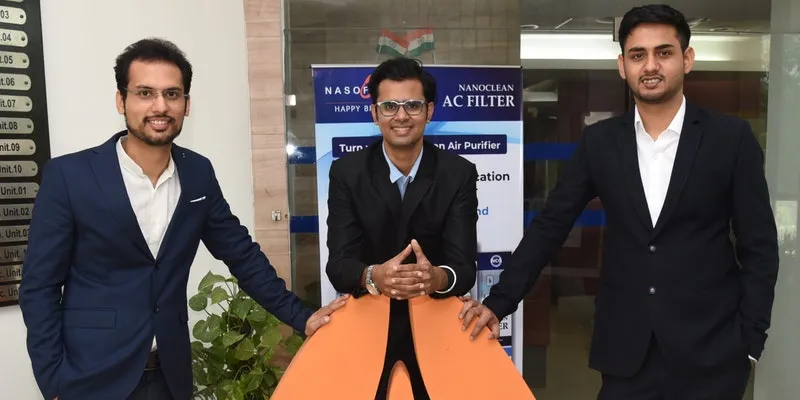Meet these 4 startups fighting pollution with ideas from thick air
From Beijing-based Smart Air to Delhi’s Air Pollution Action Group, a number of social enterprises and business ventures are collaborating with government bodies, civil society, and NGOs to fight air pollution
Sometimes we think a genius idea is needed to enter the startup world and we look far and wide for one. But, often, we just have to look around at the things we are deeply involved in or are concerned about to know what to invest in. It can be a passion or a concern related to anything in the world. For instance, a cause as basic as air.

Representational Image
The National Capital Region (NCR) and the main cities in India have been suffering from severe air pollution over the last few years, especially during winter. Last month, New Delhi, home to nearly 20 million people, declared a health emergency after its air quality registered a 500 AQI-plus pollution level.
The crisis even drew the attention of celebrated Hollywood actor and climate activist Leonardo DiCaprio, who took to Instagram to amplify the voices of Indian citizens demanding action to deal with the toxic air pollution in the country, especially in the national capital.
People close to the cause say air pollution has become a very serious problem, not just in Delhi but in other Indian cities as well where the air quality has been deteriorating and already gone beyond safety levels on the back of rapid urbanisation.
In recent times, a number of individuals have come forward to do their bit to fight air pollution.
Here is a short list of businesses started up by entrepreneurs who have turned their concern for the country’s air quality into either a profitable venture or a sustainable social enterprise or both.
DIY / jugaad air purifiers
Developed by Thomas Talhelm for the China market in 2013, Smart Air is a social enterprise built around the ethos of frugal innovation. With its do-it-yourself (DIY) kit, it is disrupting the air purifier space in India. Priced at just Rs 3,500, it costs almost half of most branded air purifiers available in the Indian market.
The startup has grown leaps and bounds, and has expanded its reach to India, Mongolia, and the Philippines with shipments to Thailand, Pakistan, and Indonesia. It was launched in Delhi in 2015.
And, the company was not started with just a vision to ‘start up’. Its beginnings were deeply rooted in a concern and a cause.
In January 2013, Thomas, a PhD student, was doing his research in Beijing when the ‘airpocalypse’ struck. The air pollution in China was so high that it was ‘beyond index’ — higher than the air quality index ratings. Thomas felt he had to do something about it. And then, when he went to buy an air purifier for himself, he was taken aback by the prices. The most popular air-purifying machine in Beijing was priced at over $1,000, and, for a grad student like him, it cost an arm and a leg.

Thomas Talhelm
Not ready to give up on air purifiers, Thomas dug deeper. He wondered, ‘what’s inside those magic boxes that make them so expensive?’ He soon learnt that the ‘active ingredient’ in most air purifiers was the HEPA filter. He figured out that a fan pushes air through the HEPA filter, and that was it.
“That’s all you need to filter dangerous particles from the air you breathe,” he realised. Thomas thought, ‘if purifiers are so simple in their functioning, can’t we just build one on our own?’
So, he bought a HEPA filter and strapped it onto a fan he had at home. And voila! An air purifier was ready, for just about $30. But, as a self-professed nerd, he couldn’t stop there. He wondered if the purifier he had put together could really capture the tiny PM2.5 particles of pollution that are capable of going deep into our lungs.
He then spent nearly 10 times the initial amount invested and bought a piece of testing equipment — a laser particle counter. Thomas turned the DIY purifier on in his bedroom and tracked particulate levels across multiple tests.
He published this data online along with instructions about how other people could make their own air purifiers. A few newspapers and magazines wrote about Thomas’s ‘discovery’, and word spread in Beijing. Seeing the growing demand, Thomas teamed up with friends Gus Tate and Anna Guo to launch Smart Air in 2013 in Beijing.
Soon after, Thomas started receiving emails from India. With India regularly topping the list of the world’s most-polluted cities, people were worried about the rising air pollution levels but were stuck without affordable purifiers.
“The emails said the DIY purifier really fit the ‘jugaad’ spirit [of the country],” says Thomas. So, in 2015, Smart Air was launched in Delhi.
What sets Smart Air apart is that the company is a registered social enterprise whose mission is to cut down the cost of clean air and clear out the marketing noise that inflates profit margins.
The company says it is able to do this by leveraging its smart business model. The company cuts out the middleman and ships most of its purifiers on its own. Because Smart Air is a social enterprise, profit is not its first motivation.
“We intentionally keep our prices as low as possible, with profit margins far lower than the industry norm. Then, we take those profits and reinvest in open-source testing, workshops, and designing of new machines,” says Dhariyash Rathod, India Head, Smart Air.
He shares that 100 percent of the profits goes into creating clean air. According to Dhariyash, the business model is based on a positive-feedback loop. “The more purifiers we ship, the more revenue we have, and the more revenue, the more we have to reinvest into providing people with clean air. That means every Smart Air purifier you buy helps more people protect themselves from the harms of air pollution.”
Since its inception in India, the company has shipped over 8,000 DIY air purifiers. Without accepting any outside investment, it has remained self-sustaining since day one.
Currently, Smart Air wants to expand its operations to more areas where awareness on air pollution is limited. It aims to do this by scaling its workshop initiatives to train air pollution educators and leaders in every target city so these individuals can consistently implement interventions in their communities.
Clean air at Rs 10
Delhi-based startup Nanoclean came into the market in early 2017 with ‘Nasofilter’, a kind of nasal filter that costs only Rs 10. This year, the company launched AC filters that can turn any AC into an air purifier, costing only Rs 399.
Nanoclean was founded by IIT Delhi alumni Prateek Sharma, Tushar Vyas, and Jatin Kewlani. In 2017, it won the ‘Startup National Award’ conferred by the President of India. The startup also has multiple grants to its name from the Government of India, including from the Department of Science and Technology and a recent joint-grant from the Ministry of Human Resource Development and IIT Delhi.

Nanoclean was founded by IIT Delhi alumni Tushar Vyas (left), Prateek Sharma (middle), and Jatin Kewlani.
The original idea for the product was born from a need Prateek saw in his own home. His mother was an asthma patient, and he grew up trying to get hold of the best products available in the market to fight pollutants and ensure cleaner air for her. The devices available at the time were either too large or covered her face, as was the case with face masks, or they were uncomfortable, like the nosebuds that had to be inserted into the nostrils.
“So, the problem statements were there in front of me. That is, one product was covering the face and the other was inserted inside the nostrils. The solution to both the problems lies in Nasofilter, which I’m wearing on my nose,” says Prateek, Co-founder and CEO of Nanoclean, pointing to the rather inconspicuous filter on his nostril.
Hailing from the western part of Rajasthan, Prateek, who is only too familiar with the dust storms in the region, saw a greater need to create a product that was effective in fighting pollutants and was affordable without being conspicuous like the other products in the market.
Nasofilter was, hence, developed using nanotechnology, which ensures there is a minimal pressure drop while breathing and enables easy breathing with the respiratory mask. Prateek and his team essentially created nano fibres to filter out pollutants by reducing the thread diameter of a normal fabric by 100 times.
But, can Nanoclean make money by developing low-cost preventive measures for air pollution and innovations for air filtration? The CEO says yes — according to him, the startup has been profitable since the beginning of this year. He attributes it to the company’s smart business strategy of not only catering to India but the world and its products being priced differently in international markets.
The startup clocks 75 percent of its business from exports to countries and regions including Thailand, Indonesia, Vietnam, the Gulf, France, and the UK.
For Nanoclean, the air is charged and holds a lot of promise.
The useful pollution
Delhi-based Chakr Innovation’s journey is a story of innovation where the startup converted air pollution into something useful.
The company was started in 2016 by Arpit Dhupar, Kushagra Srivastava, and Prateek Sachan , alumni of IIT Delhi. The idea behind the venture originated when Arpit, who is now the CTO at Chakr, went to a roadside stall for sugarcane juice in Gurugram. The sugarcane vendor was using a small diesel engine to run the juicer and power the crushers. The engine’s exhaust faced a wall that had turned black from the emissions.
This led Arpit to think ‘what if we do this [capture emissions] with purpose?’ Thus began extensive research and experimentation, which resulted in the launch of Chakr Innovation.
The company’s core product, Chakr Shield, captures diesel soot from generators and converts it into inks and paints. Chakr Shield works on an innovative solvent-based method. It collects around 90 percent of particulate matter emissions, which is essentially black carbon. The matter then undergoes various proprietary processes that remove heavy metals and carcinogens (substances or agents that can lead to cancer). It is then converted into a purified carbon-based pigment.
In the final stage, the carbon is taken through another chemical process to make different types of inks and paints, thus fully ensuring the disposal of the pollutants in the most environmentally benign way.

Ink made from recycled diesel soot
The device is composed of a heat exchanger, which reduces the temperature of the exhaust without consuming any energy. This cooled exhaust is passed through a chamber, where the particulate matter is coagulated and ultimately captured. The captured carbon is then washed down by an engineered solvent which holds the soot without chemically reacting with it. This soot-dissolved solution is then processed into an ink pigment.
Chakr Innovation’s current reach covers Delhi-NCR, Pune, and Bangalore. It has successfully deployed its emission-control technology at over 70 sites in association with companies like Titan, Hindustan Petroleum, and Mahindra World City. According to media reports, the company has already leveraged its innovation to capture 500 kilograms of particulate matter.
In June this year, the startup bagged funding of Rs 19 crore from Indian Angel Network (IAN) to penetrate deeper into the Indian market. Going forward, Chakr Innovation aims to continue developing innovative technologies to combat the threats of air pollution and climate change.
Former Airtel CXO to launching Air Pollution Action Group
Mohit Beotra (51) was working as the chief brand officer at Airtel, when he decided that he needed to make a shif. After spending two decades in the corporate world, caught in the rigmarole of fixed routines, boardroom meetings, and structured processes, he was keen to give back to society and create change.
Mohit left his job at Airtel and went on to establish the Air Pollution Action Group (A-PAG), a social initiative that aims to create awareness about air pollution among citizens and work with the government to implement measures to improve air quality.

51-year-old Mohit Beotra
“It all started when I read a story in The Economist a year ago about how countries across the globe were being exposed to polluted air on a daily basis. The feature mentioned that India housed 14 of the 20 most polluted cities in the world due to factors like increased vehicular emissions, shrinkage of green cover, stubble burning, and poor waste management,” he says.
The article struck a chord in Mohit, and he decided that the time to act was now.
Luckily, in starting A-PAG, a friend agreed to invest in the activities of the group. About a month after the foundation’s establishment, three other individuals, Nipun Matreja, Aashima Arora, and Samarth Ayasya, joined the endeavour after quitting their corporate careers.
Mohit then kickstarted a social media campaign to create awareness and drive citizen engagement for air pollution. With his team of five, he created a YouTube channel, ‘Pollution Ka Kya Plan Hai?’, and began putting out content in the form of catchy videos. The videos showcased startling facts about pollution, the associated health risks, and how the situation could be improved.
Most of the videos were launched during the Lok Sabha Elections in 2019 with the intent to question the government about its efforts to curb pollution. In a few days, the channel went viral and caught the attention of over six million people.
Political will is critical when it comes to battling air pollution due to the sheer scale of the problem and the need for systematic and long-term intervention. Hence, Mohit spent two months to figure out how A-PAG could collaborate with the government and help them in the process.
“We set up meetings with various stakeholders like the Pollution Control Board, government bodies, civil society, and non-governmental organisations to understand the kind of measures needed to reduce pollutants in the air. After that, my team and I started working with the State governments of Punjab and Delhi,” Mohit says.
The entrepreneur plans to continue his efforts to try and solve the crisis of air pollution through A-PAG.
(Edited by Athirupa Geetha Manichandar)





![[Funding alert] IAN Fund leads Rs 19 Cr Series A round in pollution control device maker Chakr Innovation](https://images.yourstory.com/cs/wordpress/2015/03/raising-funds.jpg?fm=png&auto=format&h=100&w=100&crop=entropy&fit=crop)






![[Weekly funding roundup Jan 4-10] VC inflow shows steady rise](https://images.yourstory.com/cs/2/220356402d6d11e9aa979329348d4c3e/funding-lead-image-1669386008401.jpg?mode=crop&crop=faces&ar=1%3A1&format=auto&w=1920&q=75)